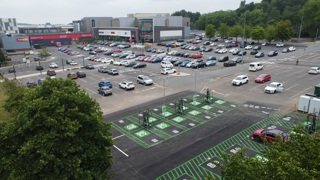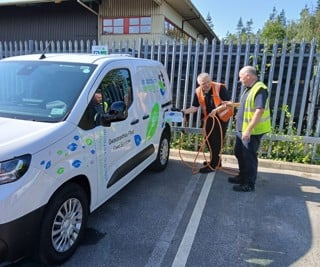A Modern Transport Bill, which encourages investment in driverless cars and aims to ensure insurance is available to their users, has been announced by the Queen at the state opening of Parliament.
The Government says the Bill will help cut red tape and put the right framework in place to allow innovation, which it claims will put the UK at the forefront of autonomous and driverless vehicle ownership and use.
In addition, it hopes the Bill will encourage further investment in electric cars and introduce new rules to bring safe commercial and personal drone flight for households and businesses a step closer.
Paul Willcox, chairman of Nissan Europe, said: “Any new legislation, such as we’ve seen announced, that supports the adoption and integration of autonomous vehicle technologies, is a positive for the UK.
“Autonomously-equipped vehicles will improve the safety and well-being of drivers, with fewer collisions and reduced traffic congestion. The UK economy can also benefit, by playing a pivotal role in a global industry estimated to be worth £900billion by 2025.”
Phil Harrold, automotive partner at PwC, believes the Queen's speech reinforces the need for the UK to continue investing, both financially and logistically, in order to remain at the cutting edge of new vehicle technology - from propulsion systems to autonomous vehicles.
"In recent years we've seen a gentle creeping of transport automation, with UK engineering driving much of this capability,” he said. “However, the real road test will be persuading the general public to readily accept even more car or van autonomy, and for developers, manufacturers and the Government to robustly respond to any safety concerns consumers may have.
“There are precedents they can lean on - after all, who would have thought 10 or 15 years ago that we'd readily travel on driverless trains at the airport.
“Ultimately, for autonomous consumer transport modes to succeed, it's vital that 'perfection' isn't set as the default benchmark during the highway test phases or on roll-out - we don't expect this of other drivers on the road - and that what is aimed for is a realistic and marked improvement on human fallibility levels."
LeasePlan UK also welcomed new driverless car legislation in the Queen’s Speech. “Autonomous vehicle technology is already here and the fleet industry is poised to welcome the right legislation and insurance or legal requirements needed to bring driverless vehicles onto our roads,” said Lesley Slater, operations and business development director at LeasePlan UK.
“This endorsement from our Head of State, and welcome nod to future of transport, signals Britain is at the forefront of this exciting technology which could help make our roads safer and more efficient.”
However, while welcoming today’s announcement as an important step forward, which will ultimately improve road safety and reduce congestion, the Institution of Engineering and Technology (IET) said the Government also needs to introduce legislation to improve cyber security in autonomous vehicles.
Hugh Boyes, the IET’s cyber security expert, said: “We must ensure that cyber security is carefully considered. It is not just about the threat of a car being hacked, it also relates to the overall security and safety of the vehicle’s operation.
“For that reason it will be crucial that the Government introduces proper regulations for autonomous vehicles, which should include the need for a software MOT to be performed on a regular basis. This should help to assure the ongoing trustworthiness of the vehicle software and systems.
“How these checks happen – and who is responsible for them – is something we should be thinking about now.
“While we are used in our daily lives to putting up with software errors in non-safety critical situations, such as when our computers freeze and require a reboot, we cannot tolerate such behaviour in autonomous vehicles as this could put the safety of the vehicle’s passengers and those outside the vehicle at risk.”
Jonathan Hetwett, vice president of Octo Telematics, similarly shares the IET’s concerns. He said: “The need to protect data in the shift to connected, driverless and autonomous cars is implicit and those behind the connected car movement must operate to the highest levels of system security standards.
“Against this backdrop, today’s joint BIS and Innovate UK announcement about the winners of their multi-million pound research grant to fuel developments in user-centric autonomous vehicle technology, including research to address security risks associated with connected cars, is a significant boost for the industry.
“A user-focused, security-first approach to every layer of the connected car will be essential.”
More details on the Modern Transport Bill are expected to be released in the coming weeks.





















a ghost - 21/05/2016 08:44
Who are they trying to kid? the roads are not in a fit state for tractors never mind cars, and driverless ones at that! fix the bloody infrastructure first you morons!